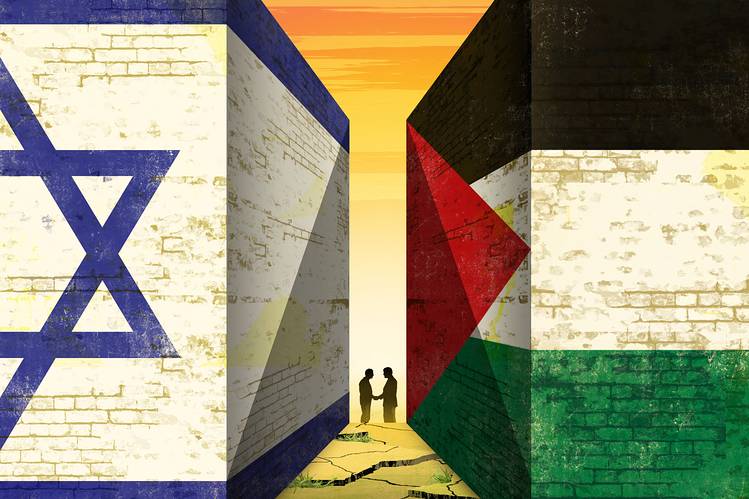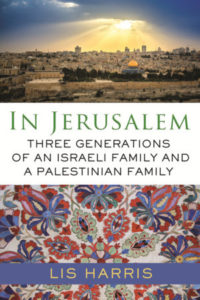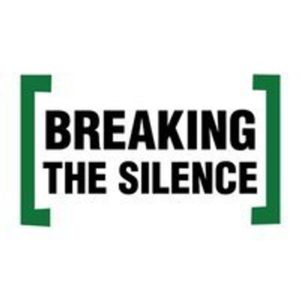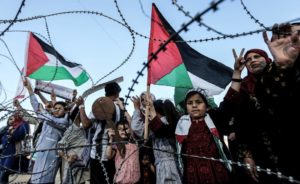Book Review of In Jerusalem: Three Generations of an Israeli Family and a Palestinian Family
A personal reflection on the conflict in Israel/Palestine and a review of Lis Harris's book.
 As a Jew who publicly identifies with the Palestinian civil society movement for the Boycott, Divestment, and Sanction (BDS) of Israel, I am painfully familiar with the Israeli/Palestinian conflict that Lis Harris tackles in her new book. As an avid reader of the New Yorker, I am also well acquainted with her profound capacity for storytelling. Reading In Jerusalem, a work Harris labored over for a decade, was therefore both a painful and poignant experience.
As a Jew who publicly identifies with the Palestinian civil society movement for the Boycott, Divestment, and Sanction (BDS) of Israel, I am painfully familiar with the Israeli/Palestinian conflict that Lis Harris tackles in her new book. As an avid reader of the New Yorker, I am also well acquainted with her profound capacity for storytelling. Reading In Jerusalem, a work Harris labored over for a decade, was therefore both a painful and poignant experience.
I have found myself uncomfortable with the state of Israel since it began its occupation of Gaza and the West Bank more than fifty years ago. Spending my Junior year at Hebrew University in Jerusalem in 1969-1970, I was often ill at ease with the idea that the Jewish state I had admired from afar had become an occupying power that celebrated its military exploits with gusto. Learning songs about how the “blue and white flag” conquered the Straits of Tiran and other such expressions of joy at their victory in the 1967 War was at odds with my experiences of protesting the war in Vietnam on my campus at home. The lesson I derived from that year in Israel was that I was an American Jew, not an Israeli, despite the fact that my education was being paid for by the American Friends of Hebrew University in an effort to encourage me to fall in love and make Israel my home.
Returning to the states and entering rabbinical school, I committed myself to American Jewish life, sometimes lamenting the close connection the community had to Israel, sometimes being involved with organizations like Breira and New Jewish Agenda that protested the Occupation, but mostly ignoring my community’s pervasive Zionism and my discomfort with Israeli policies.
It was not until years later in the mid-1980s, when I no longer worked in the Jewish community, that I felt free to write and speak publicly about those concerns. It was a lonely pursuit. There were not many Jewish spaces where it was acceptable to question whether it was possible to have a Jewish state that was both ethno-religious and democratic. And I was not always comfortable with Palestinian violence as a response to the state violence Palestinians experienced at the hands of the Israeli government.
But things changed. Left-wing Israelis began to re-examine their history and expose the settler colonialism at the root of the establishment of the Israel. Palestinian civil organizations began the call for Boycott, Divestment, and Sanction of Israel, a non-violent response to Israeli state power. An organization, Jewish Voice for Peace (JVP), provided Jews like me with a way to support the Palestinian cause. I became part of the rabbinic cabinet in JVP, and a leader in the Religious Scholars for BDS at the American Academy of Religion. In those ways, I finally found a home with colleagues to protest, lament, and articulate my political concerns.
***
 As a BDS supporter, I probably should not admit to appreciating or even reading this book’s version of “the conflict” as Harris and most Israelis call it, told through the experiences of two Jerusalem families, a left-leaning Ashkenazi Jewish family and an indigenous Palestinian family living in West and East Jerusalem, respectively. The equivalence that she makes between the families and her willingness to tell the story from both perspectives seems contradictory to someone like me who can no longer countenance the horrors Palestinians experience at the hands of the Israeli government and military. Listening to Jewish Israeli voices, even (or maybe especially) the dwindling minority who themselves question the democratic possibility of the Zionist enterprise, is problematic. This book could be easily accused of “justice washing”—implicated in the Israeli government’s campaign to brand Israel as a democratic society that allows all kinds of dissent.
As a BDS supporter, I probably should not admit to appreciating or even reading this book’s version of “the conflict” as Harris and most Israelis call it, told through the experiences of two Jerusalem families, a left-leaning Ashkenazi Jewish family and an indigenous Palestinian family living in West and East Jerusalem, respectively. The equivalence that she makes between the families and her willingness to tell the story from both perspectives seems contradictory to someone like me who can no longer countenance the horrors Palestinians experience at the hands of the Israeli government and military. Listening to Jewish Israeli voices, even (or maybe especially) the dwindling minority who themselves question the democratic possibility of the Zionist enterprise, is problematic. This book could be easily accused of “justice washing”—implicated in the Israeli government’s campaign to brand Israel as a democratic society that allows all kinds of dissent.
If I am boycotting Israel, then shouldn’t I boycott books that tell the Israeli side of the story? Should I be listening to their voices? Some left-wing Israelis support a boycott, seeing it as the only way to call the world’s attention to the plight of Palestinians under Israeli rule. Should I forsake my principles to read a book by someone I admire? Despite these doubts, I read on. It turned out to be a good decision.
Perhaps because Harris is open to telling this story from both sides, this book can do more to awaken awareness of Israel’s horrific rightward turn than any one-sided account could. Harris begins by revealing her reason for writing and sharing her point of view. She explains that she feels “implicated by the way Palestinians were treated,” noting that as a secular American Jew she “could never quite shake the conviction that the country’s antidemocratic moves, whatever else they were, were so contrary to the Jewish values I was raised with.” While we have chosen different paths, I think Harris and I end up at the same place. The stories she tells provide crystal clear evidence of the divergence between the key Jewish value we were both raised with, “to treat others as you would like to be treated,” and what is taking place in Israel today.
In the prologue, Harris quotes a Jewish Israeli friend who, on a peaceful night in the desert, responds to her request to talk about the Palestinians by commenting, “Wake me when the Israeli-Palestinian conflict is over.” She closes with an excerpt of a poem by Palestinian writer Taha Muhammad, which hints at a similar theme:
After we die
and the weary heart
has lowered its final eyelid
on all that we’ve done,
and on all that we’ve longed for,
and all that we’ve dreamt of,
all we’ve desired
or felt,
hate will be
the first thing
to putrefy
within us.
These two comments typify the sadness that permeates the book. No one expresses hope that a resolution will exist any time soon. What is particularly striking, however, is how hopeful Harris herself remains. Her work helps us understand how the situation became so intractable, and how individual people manage to cope, even if few share her optimism.
 The Jewish Israeli family Harris profiles in the book is not representative of the common attitude for Jews in Israel to “wake me up when it’s over.” Instead, the Jewish family she introduces readers to—that of Ruth Cohen—is an outlier that showcases the ever-diminishing number of Jewish Israelis who advocate for Palestinian rights and who fight to make their voices heard. Ruth’s husband Yaron published widely on the government’s failures to end the Occupation. Ruth’s brothers have been part of the small group of men and women (Soldiers Against Silence, Breaking the Silence) who have publicly described the atrocities they saw committed by their fellow Israeli citizen-soldiers against Palestinians at checkpoints and at war. Yaron’s daughter Talya, who is involved with several human rights groups that fight legal battles to protect Palestinian property from destruction by settlers, has taken the most radical position, openly questioning the necessity of a Jewish state now or in the future.
The Jewish Israeli family Harris profiles in the book is not representative of the common attitude for Jews in Israel to “wake me up when it’s over.” Instead, the Jewish family she introduces readers to—that of Ruth Cohen—is an outlier that showcases the ever-diminishing number of Jewish Israelis who advocate for Palestinian rights and who fight to make their voices heard. Ruth’s husband Yaron published widely on the government’s failures to end the Occupation. Ruth’s brothers have been part of the small group of men and women (Soldiers Against Silence, Breaking the Silence) who have publicly described the atrocities they saw committed by their fellow Israeli citizen-soldiers against Palestinians at checkpoints and at war. Yaron’s daughter Talya, who is involved with several human rights groups that fight legal battles to protect Palestinian property from destruction by settlers, has taken the most radical position, openly questioning the necessity of a Jewish state now or in the future.
The Palestinian family Harris introduces readers to is also unique. Unlike many Palestinians, Niveen Abuleil and her family do not engage in the coping mechanisms of anger and protest even though they have been exiled from their home and live under occupation. They are, as Harris describes, “dug in.” To the best of their ability, they have remained in place, making lives for themselves despite the indignities and deprivations they have faced. Like the Cohens, they are educated professionals. Unlike the Cohens, they are subject to harassments on a regular basis, from forced migration to humiliating experiences at airport security and checkpoints to actual brushes with death. Yet they welcomed Harris into their homes and talked to her about their lives. While their experiences reflect the weariness, longings, and dreams the poet Taha Muhammad described, perseverance, not hatred, is what drives them.
The stories both of these families share with Harris are powerful and poignant, and she narrates them exquisitely. They more than justify a central argument of this work: that the memories shared by individuals across generations should be taken seriously alongside facts derived from the historical record. While those stories form the heart of In Jerusalem, Harris has also familiarized herself with the historical sources, as the extensive bibliography suggests. She does an incredible job of distilling all that history, and making it come alive through the voices of the Cohen and Abuleil clans. These stories make for a vivid entrée into the complexities of Zionism, the Holocaust, the British mandate, and the Muslim Middle East that underlay and determined the present situation.
Harris’s parallel stories of two atypical and traumatized families could have given the reader a mistaken sense of equivalence. But Harris is clear throughout: despite (or perhaps because of) the traumas faced by European Jews and Israel in the past, Israel is currently a powerful state that is oppressing a less powerful people. She states it in no uncertain terms:
Though Israeli officials have never ceased characterizing the nation as a victim, that description now seems ludicrously inapplicable. Israel has gradually become a major regional colonial force and, according to some estimates, is among the world’s largest military powers.
This power differential is obvious in the stories told by all the protagonists, but is most abundantly clear when we meet the family outliers, Niveen’s Aunt Rasmea and Ruth’s son Yotam, who themselves are more representative versions of Israelis and Palestinians.
No one in Niveen’s family mentioned Rasmea for the first year Harris spent with them. Rasmea was radicalized when the occupation began. An Israeli court convicted her for her role in the 1969 bombing of a Jerusalem supermarket. She confessed to the crime, and was sentenced to three life sentences. She later claimed the confession she gave was forced and obtained under torture, which Harris describes in gruesome detail. Rasmea served a ten-year sentence in an Israeli prison, was released in a prisoner exchange, and moved to Chicago. She was later arrested in the United States for not mentioning her detention in Israel on her immigration form. She was found guilty by a judge who would not let her enter evidence about the PTSD she experienced that made her want to forget that part of her life. Although that ruling was vacated by a higher court and expert witnesses were ready to testify on her behalf, the Trump administration reclassified her case as a terrorism indictment. To avoid a likely a prison sentence, she took a plea and accepted deportation.

Rasmea’s story is a reminder that while the Cohens and Abuleils pursue peace, the violence on both sides cannot be brushed aside. Harris uses Walter Benjamin’s distinction of sanctioned and unsanctioned violence to suggest that Palestinian “terrorism” is no different from the terrorism of pre-state Israelis who did their fair share of bombing and pillaging of homes and villages; the only difference being that the latter were on the winning side. But her preference, even in this chapter, is to resist that narrative and highlight families like the Abuleils and Cohens, and groups like the Parents Circle-Families Forum, that continue to work for peace and reconciliation.
The chapter about Rasmea is followed by a chapter about Yotam, Ruth’s son from her first marriage. He too is an outlier in his family, having adopted the religious passion of the Haredi lifestyle, dreaming of a messianic age and the rebuilding of the Temple. Yotam believes that in some distant future Jews and Muslims will live in peace together if they reject the Western concept of the nation-state and agree to live governed by Jewish morality. He cannot explain why Muslims would assent to live by Jewish teachings, and Harris finds his idealism perplexing and a bit confusing; not the kind of hope she can make sense of from her secular vantage point.
Despite their status as outliers, Rasmea and Yotam’s stories reveal the contrasting realities of these families’ lives: Rasmea has been forced to give up her dream of returning home. Yotam’s dream lives on, even as it reveals the holy unreality of the present and future of Jerusalem.
That Harris could immerse herself in this world and come away with a counter-narrative that overcomes the brutality, violence, and pain, and tells the story with great nuance and complexity, is a triumph of the power of stories and the perseverance of the storyteller. The book is well worth the read. Moved by her optimism, I am hoping it can change minds if not lives.
Rebecca Alpert is a Professor of Religion at Temple University. She is the author or editor of nine books, including Religion and Sports: An Introduction and Case Studies (Columbia University Press, 2015), Out of Left Field: Jews and Black Baseball (Oxford University Press, 2011), and Like Bread on the Seder Plate: Jewish Lesbians and the Transformation of Tradition (Columbia University Press, 1997).